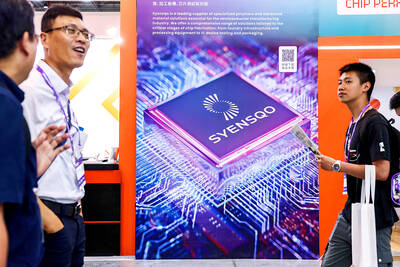TaiGen Biopharmaceuticals Holdings Ltd (太景醫藥研發控股) swung into profit last year with net profit of NT$775 million (US$27.1 million) after it received a bonus payment from China’s Zhejiang Medicine Co (浙江醫藥集團), it said yesterday.
Last year marked TaiGen’s first profitable year since 2017, as it registered net losses of NT$343 million in 2018, NT$295 million in 2019 and NT$404 million in 2020.
Despite reporting earnings per share of NT$1.08 for last year, the company’s board of directors has proposed not to distribute a cash dividend this year, TaiGen said.
The company attributed the improvement in its balance sheet to a payment of NT$1.29 billion from Zhejiang Medicine to buy TaiGen’s Chinese patent of its antibacterial drug Taigenxyn (nemonoxacin).
The money was used to develop the new experimental anti-influenza drug TG-1000 and a new antibiotic for a drug-resistant bacterium, the company said in a statement.
“We are still compiling the data generated in our phase 2 clinical trials for TG-1000, so it will take a while before we reveal the results,” TaiGen chairman Philip Huang (黃國龍) said in the statement.
TaiGen finished recruiting all 202 participants for human tests last month.
The company would determine the overseas market for the development of TG-1000 after phase 2 human trials are completed, Huang said.
Although the phase 2 tests are being conducted in China, the test results can be used to file an application with the US Food and Drug Administration, as the protocols of the tests meet the agency’s requirements, Huang said earlier this year.

SEMICONDUCTOR SERVICES: A company executive said that Taiwanese firms must think about how to participate in global supply chains and lift their competitiveness Taiwan Semiconductor Manufacturing Co (TSMC, 台積電) yesterday said it expects to launch its first multifunctional service center in Pingtung County in the middle of 2027, in a bid to foster a resilient high-tech facility construction ecosystem. TSMC broached the idea of creating a center two or three years ago when it started building new manufacturing capacity in the US and Japan, the company said. The center, dubbed an “ecosystem park,” would assist local manufacturing facility construction partners to upgrade their capabilities and secure more deals from other global chipmakers such as Intel Corp, Micron Technology Inc and Infineon Technologies AG, TSMC said. It

People walk past advertising for a Syensqo chip at the Semicon Taiwan exhibition in Taipei yesterday.

NO BREAKTHROUGH? More substantial ‘deliverables,’ such as tariff reductions, would likely be saved for a meeting between Trump and Xi later this year, a trade expert said China launched two probes targeting the US semiconductor sector on Saturday ahead of talks between the two nations in Spain this week on trade, national security and the ownership of social media platform TikTok. China’s Ministry of Commerce announced an anti-dumping investigation into certain analog integrated circuits (ICs) imported from the US. The investigation is to target some commodity interface ICs and gate driver ICs, which are commonly made by US companies such as Texas Instruments Inc and ON Semiconductor Corp. The ministry also announced an anti-discrimination probe into US measures against China’s chip sector. US measures such as export curbs and tariffs

The US on Friday penalized two Chinese firms that acquired US chipmaking equipment for China’s top chipmaker, Semiconductor Manufacturing International Corp (SMIC, 中芯國際), including them among 32 entities that were added to the US Department of Commerce’s restricted trade list, a US government posting showed. Twenty-three of the 32 are in China. GMC Semiconductor Technology (Wuxi) Co (吉姆西半導體科技) and Jicun Semiconductor Technology (Shanghai) Co (吉存半導體科技) were placed on the list, formally known as the Entity List, for acquiring equipment for SMIC Northern Integrated Circuit Manufacturing (Beijing) Corp (中芯北方積體電路) and Semiconductor Manufacturing International (Beijing) Corp (中芯北京), the US Federal Register posting said. The